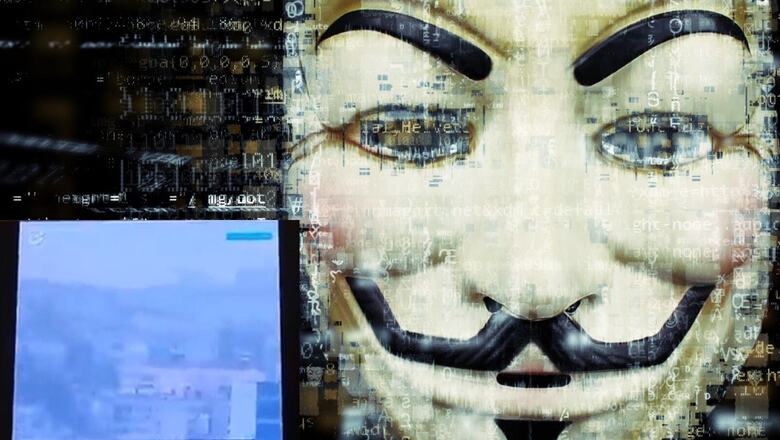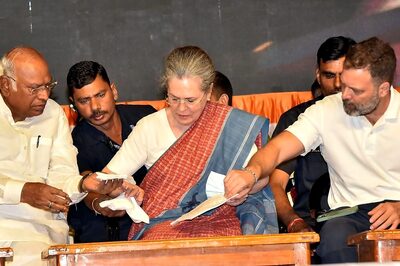Anonymous Launches Cyberwar against Russia over Ukraine Conflict: Know The No-Name Hacker Collective

views
An international group of hackers, Anonymous, has declared cyber-war against the Russian government after President Vladimir Putin announced a “special military operation” against Ukraine and began bombarding major cities.
The group recently hacked into Russia’s media censorship agency Roskomnadzor and stole emails, as well as files amid fears that Russian leaders would shut down the internet.
The files stolen by Anonymous hacktivists, who are attempting to undercut Putin’s propaganda, were published by Distributed Denial of Secrets (DDoSecrets).
The Russian government’s Roskomnadzor agency is attempting to prevent Russians from getting true, unbiased information regarding the invasion of Ukraine. As a response to that, the group posted footage of Russian TV channels being hacked to display coverage of the war last week.
Russian Targets
Roskomnadzor, which is the Russian government agency in charge of controlling access to social media sites such as Facebook and Twitter, became the latest target of Anonymous.
The Russian agency recently threatened to block Wikipedia access due to its coverage of the Ukraine invasion. It also has issued a directive for all Russian media outlets to only use state-approved information sources or suffer retaliation.
However, on March 10, a tweet by Anonymous TV stated: “#Anonymous has successfully breached and leaked the database of Roskomnadzor, the Russian federal executive agency responsible for monitoring, controlling and censoring #Russian mass media, releasing to the public over 360K files #OpRussia.”
Concerns that Russia may be cut off from the world internet have prompted the hackers to publish their data in the hopes of exposing the censorship that the Russian government is putting on its citizens. Hacktivists want to keep Russians connected to the rest of the world and alternative media.
Anonymous also hacked Russian news channels Russia 24, Channel One, and Moscow 24 and broadcasted footage of harrowing assault scenes along with the message ” Ordinary Russians are against the war” on the TV screen.
The group has also claimed responsibility for a number of other cyber attacks, including the shutdown of the Kremlin’s official website, the hacking of the Ministry of Defence database, and the takedown of over 300 Russian media, as well as banking websites.
Who Are They?
The hacking movement by Anonymous is thought to have begun in the early 2000s.
But it first gained prominence in 2008 when it hacked America’s Church of Scientology after the group launched a distributed denial-of-service attack, during which multiple computers send requests to the victim’s server in an attempt to overwhelm and shut it down.
Despite the fact that many supporters have praised Anonymous over the years, members of the hacking collective have faced legal consequences for their actions.
Arrests by the FBI have resulted in charges of cyberstalking, computer hacking, and fraud.
Basically, it’s a nebulous group that can encompass anyone who wants to exploit the brand to promote their cause.
It is believed that while there are no defined objectives, there is an underlying desire to fight censorship, promote free expression and resist government control that motivates members of the so-called collective to take action.
However, in 2012, at the height of its popularity, Anonymous was believed to be a network of thousands of activists, the majority of whom were hackers.
Around the same time, this group launched a series of cyberattacks against Indian websites—belonging to government departments, Supreme Court, and two political parties.
As reported, Anonymous said that the attacks were carried out in retaliation for the blocking of well-known video and file-sharing websites. The Indian anti-piracy firm responsible for the shutdowns of Vimeo, DailyMotion, and The Pirate Bay was also targeted at that time.
Prior to that, Anonymous launched “Operation Payback,” a broad campaign to punish pro-copyright organisations that had cracked down on Internet piracy in 2010. Later, the initiative was expanded to include companies and individuals who had spoken out against Wikileaks and its founder, Julian Assange.
When MasterCard stopped processing Wikileaks-related payments, Anonymous crippled the company’s websites with denial-of-service attacks. Visa, PayPal and Assange critic, then US senator Joe Lieberman’s website, all suffered the same fate.
However, after years of relative quiet, the group once again appeared in 2020 amid widespread civil unrest in the United States following the George Floyd case.
During violent protests in Minneapolis over the death of Floyd, Anonymous reappeared and vowed to reveal the many “crimes” of the city’s police to the rest of the globe.
Read all the Latest Tech News and Breaking News here




















Comments
0 comment